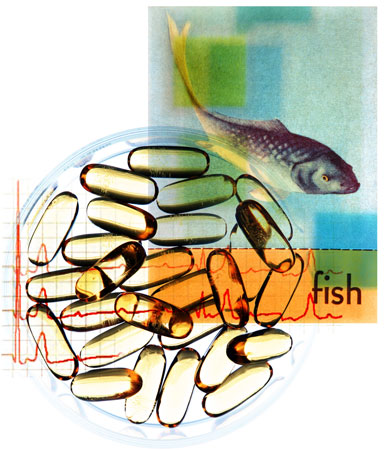
Fish oil, found in salmon and tuna or available as a supplement, is one of those supplements that’s recently taken off massively in terms of its popularity as a cure all for almost any ailment and as a natural health booster. Unlike many of these fads however, fish oil has many very real benefits that have been backed up with research. The side effects of fish oil are clearly noticeable and will indeed make you healthier and cure many health complaints. But what effects are those? And are there any fish oil side effects that you need to be wary of?
Well let’s start with the good. Studies are being published on an almost daily basis that reveal over and over again the countless benefits of fish. Most of these are a result of either the omega 3 fatty acids contained in fish oil, or their ability to sooth joints.
Firstly fish oils can be used as anti inflammatories and can improve your body’s inflammatory responses. This means that conditions such as prostatitis, arthritis, cystitis (and pretty much anything ending in ‘tis’) will be far less painful and uncomfortable. Further to this Omega 3 fatty acids have many cardiovascular benefits and can help lower cholesterol and blood pressure while increasing the ‘good’ HDL cholesterol. This in turn means less chance of a heart attack, stroke or heart disease. With heart disease being one of the major killers in the Western World this can only be a good thing right?
The slightly more interesting fish oil side effects however are those that is has on the brain. Omega 3 fatty acids have been shown to improve recall, reasoning and attention by aiding the communication of neurons (brain cells) across synapses. This also helps to protect against various mental disorders, such as depression and schizophrenia and to prevent dementia and Alzheimer’s. Children too have been shown to reap benefits from fish oil side effects and cases of ADD and ADHD can be improved with supplementation. These brain benefits can also be appreciated by babies in the womb, resulting in many pregnant and nursing mothers supplementing their diets with fish oil.
As though these benefits weren’t enough of a reason to supplement with fish oil, it can also help prevent cancer – particularly breast, colon and prostate cancer. Like antioxidants, omega 3 fatty acids help to prevent alterations in normal cells that are the basis of cancer.
So there are many benefits of fish oil and omega three fatty acids, but as with any supplementation or diet change the pros need to be measured up against the side effects. So what, if any, are the fish oil side effects?
Like anything, it’s important to supplement with fish oil in moderation. If you take the recommended amount and follow any guidelines that come with supplementation then you should reap the benefits with few to no side effects. The only fish oil ‘side effects’ that you might notice are a fishy taste lingering in the mouth after first taking the oil and potentially ‘fishy burps’. Most supplements however have been put through chilling and filtration processes to prevent this being a major problem, while if you’re getting your fish oil naturally then you’ll probably anticipate the fishy taste ahead of time.
Some individuals also complain of suffering from oily skin when taking fish oils. This can potentially lead to acne, though conversely can actually be used to treat acne as it stops the body from needing to produce extra oil of its own.
It’s also important to bare in mind that fish oil thins blood (which is how it reduces cholesterol and heart disease) which while generally a good thing can be unwise if you’re already taking medication to thin your blood or if you suffer from a condition such as haemophilia, von willebrands syndrome, lupes or their derivitaves that prevent the blood from clotting.
When taken in excessive amounts however overdose is possible and fish oil side effects become more pronounced. Excessively thinning the blood can lead dizziness and low blood pressure. Other side effects that have been noted are nausea, diarrhoea, nosebleeds and heartburn. Again these are only observed when the daily doses exceed 12 grams and are still unusual even under these conditions.
Some supplements such as cod liver oil however also contain vitamins such as vitamin A and D. If taken in high doses these too can be toxic again meaning you should temper your intake of cod liver oil. If you are taking other supplements such as vitamin tablets as well then you should also ensure that the two don’t add up to more than your RDA.
Finally fish oils may contain traces of mercury and other toxins. While these will be harmless in small doses, again they may become notable health threats if taken in excess.
So to conclude fish oil side effects are many and varied and mostly very positive. Like most things though, moderation should be applied in their consumption to avoid getting too much of a good thing.
(source: http://www.healthguidance.org/authors/737/Mack-LeMouse)



